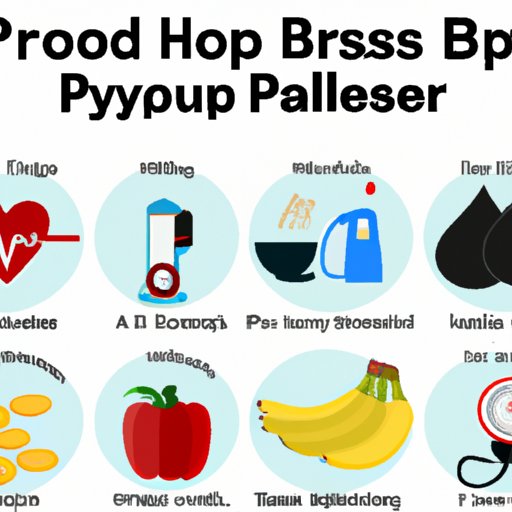
Introduction
High blood pressure, also known as hypertension, is a common health condition that affects millions of people around the world. If left uncontrolled, it can lead to serious health complications such as heart disease, stroke, kidney problems, and more. Therefore, finding ways to lower blood pressure quickly is crucial for maintaining good health and preventing the risks associated with hypertension. In this article, we will discuss some effective tips and tricks to help you lower your blood pressure in just a few minutes.
Deep Breathing Exercises: A Simple and Effective Way to Lower Blood Pressure
One of the easiest and most efficient ways to lower blood pressure quickly is through deep breathing exercises. It helps to calm the mind, reduce stress levels, and promote relaxation, which in turn can help to lower blood pressure. Here’s how you can do diaphragmatic or belly breathing:
- Find a quiet and comfortable place to sit or lie down
- Place one hand on your chest and the other on your belly
- Inhale slowly through your nose and feel your belly rise
- Exhale slowly through your mouth and feel your belly fall
- Repeat for a few minutes until you feel calm and relaxed
Do this exercise several times a day, especially when you feel stressed or anxious. You can also integrate it into your daily routine, such as doing it before bedtime or during your coffee break.
Drink Water: The Importance of Staying Hydrated for Blood Pressure Control
Dehydration can lead to an increase in blood pressure, so staying hydrated throughout the day is crucial for blood pressure control. Drinking water is the best way to stay hydrated and flush out excess sodium in the body, which can cause hypertension. Here are some tips to increase your water intake and stay hydrated:
- Drink at least 8-10 cups of water a day
- Avoid sugary and caffeinated beverages
- Carry a water bottle with you wherever you go
- Set reminders on your phone to drink water regularly
- Choose water-rich foods such as fruits and vegetables
Eat Potassium-rich Foods: A Dietary Approach for Lowering Blood Pressure
Another dietary approach for lowering blood pressure is to include more potassium-rich foods in your meals. Potassium is a mineral that helps to relax blood vessels and excrete excess sodium in the body, which can lower blood pressure. Here are some examples of potassium-rich foods:
- Bananas
- Avocado
- Sweet potatoes
- Spinach
- Salmon
- Beans and lentils
Try to include these foods in your meals regularly and aim for a daily intake of at least 2,000-4,000 mg of potassium, depending on your age and health condition.
Walk or Exercise: Get Moving for Lower Blood Pressure
Regular exercise is one of the most effective ways to maintain good blood pressure control. It strengthens the heart, improves blood circulation, and reduces stress levels, all of which can help to lower blood pressure. Here are some recommendations for effective exercise routines:
- Brisk walking or jogging for at least 30 minutes a day
- Cycling or swimming for cardiovascular strength
- Strength training with weights or resistance bands
- Yoga or Pilates for flexibility and relaxation
Choose an exercise routine that works for you and your lifestyle and try to make it a habit. Aim for at least 150 minutes of moderate-intensity exercise per week, or 75 minutes of vigorous-intensity exercise per week, as recommended by the American Heart Association.
Cut Back on Caffeine: Watch Your Intake for Better Blood Pressure Control
Caffeine is a stimulant that can cause a temporary spike in blood pressure levels. While moderate caffeine intake is generally safe for most people, excessive consumption can lead to hypertension. Here are some recommendations for limiting your caffeine intake:
- Switch to decaf or caffeine-free beverages
- Avoid energy drinks, soda, and chocolate
- Choose herbal tea or water instead of coffee or black tea
- Gradually reduce your caffeine intake to avoid withdrawal symptoms
Manage Stress: Strategies for Stress Reduction and Better Blood Pressure Control
Stress is a common trigger for high blood pressure, so finding ways to manage stress is crucial for blood pressure control. Here are some relaxation techniques that can help reduce stress levels and promote relaxation:
- Meditation or mindfulness practice
- Progressive muscle relaxation
- Tai chi or Qi Gong practice
- Deep breathing exercises as discussed earlier
Choose a relaxation technique that works for you and practice it regularly. You can also incorporate stress management into your daily routine, such as doing a quick meditation session before bed or practicing deep breathing during your lunch break.
Conclusion
Lowering blood pressure quickly may seem like a daunting task, but it doesn’t have to be. By incorporating some simple tips and tricks into your daily routine, you can achieve better blood pressure control and maintain good health. Remember to track your blood pressure regularly and seek medical assistance if necessary. With some effort and dedication, you can take control of your blood pressure and lead a healthier life.





